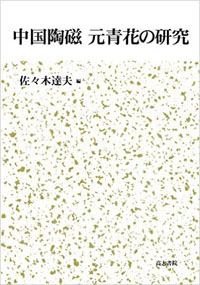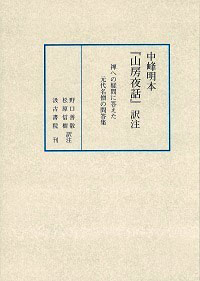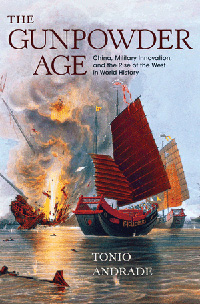日韓近期漢學出版物(十六)
22、中國陶磁——元青花の研究
時 間:2015年12月
作 者:佐々木達夫 編著
出版單位:東京:高志書院
內容簡介:
総論 元青花の誕生と継承(佐々木達夫(金沢大學名譽教授)
第1部 元青花誕生とその背景
ユーラシア游牧文化における圣色「青」と「白」(四日市康博,昭和女子大學客員研究員)
元青花磁器覚書(謝明良,國立臺灣大學教授)
景徳鎮元青花の起源に關する在地的要因考(施靜菲,國立臺灣大學副教授)
宋末元初景徳鎮の工房立地(水上和則,専修大學講師)
近年の景徳鎮における元青花研究から(關口広次,日本考古學協會)
元様式青花瓷はいつまで生產されたか(髙島裕之,専修大學準教授)
至正様式青花磁器の文様構成(杉谷香代子,戸栗美術館學蕓員)
第2部 元青花のアジア流通
フィリピン出土の元青花(田中和彥,上智大學講師)
タイ出土の元青花(向井亙,金沢大學客員研究員)
トロウラン遺跡のベトナム產タイルと元青花の文様(坂井隆,國立臺灣大學副教授)
西アジアに流通した元青花(佐々木花江(金沢大學準教授)、佐々木達夫)
第3部 東北アジアの染付·青花誕生
朝鮮半島の初期青花(吉良文男,東洋陶磁史研究家)
日本染付磁器誕生(髙島裕之)
有田皿山における藩窯の成立背景(野上建紀,長崎大學準教授)
唐青花研究の再思考(劉朝暉,復旦大學教授)
23、中峰明本『山房夜話』訳注
時 間:2015年5月
作 者:野口善敬、松原信樹 翻譯
出版單位:東京:汲古書院
內容簡介:
元代禪門を代表する中峰明本(一二六三~一三二三)は、無準師范(一一七八~一二四九)三伝の孫であり、臨済宗楊岐派(破庵派)の系譜に屬する僧侶である。その法脈は中國においては清朝に至るまで臨済の正系として法孫を繁らせており、日本に黃檗宗を伝えた隠元隆琦もこの系統に屬している。また日本においても、その法系は入元僧である無隠元晦(?~一三五八)、古先印元(一二九五~一三七四)、遠渓祖雄(一二八六~一三四四)などによって伝えられ、幻住派として日本中世禪宗史に大きな足跡を殘している。
中峰は、生涯、大剎に住持することなく、江蘇·浙江の地で庵居または舟居し、修行僧や在家信者に法を說いた。従ってその『語録』には「上堂」の語はなく「示眾」が存するのみであるが、その他に著述がいくつか殘されている。今回、訳注の対象として取り上げた『山房夜話』三巻もその一つである。その他、今回の訳注には付録(一)として『東語西話』に見える中峰自撰の行狀の文章を「中峰自敘伝」として加え、更に付録(二)として有名な『中峰和尚座右銘』を収載した。
24、The Gunpowder Age: China, Military Innovation, and the Rise of the West in World History
時 間:January, 2016
作 者:Tonio Andrade
出版單位:Princeton: Princeton University Press
內容簡介:
The Chinese invented gunpowder and began exploring its military uses as early as the 900s, four centuries before the technology passed to the West. But by the early 1800s, China had fallen so far behind the West in gunpowder warfare that it was easily defeated by Britain in the Opium War of 1839–42. What happened? In The Gunpowder Age, Tonio Andrade offers a compelling new answer, opening a fresh perspective on a key question of world history: why did the countries of western Europe surge to global importance starting in the 1500s while China slipped behind?
Historians have long argued that gunpowder weapons helped Europeans establish global hegemony. Yet the inhabitants of what is today China not only invented guns and bombs but also, as Andrade shows, continued to innovate in gunpowder technology through the early 1700s—much longer than previously thought. Why, then, did China become so vulnerable? Andrade argues that one significant reason is that it was out of practice fighting wars, having enjoyed nearly a century of relative peace, since 1760. Indeed, he demonstrates that China—like Europe—was a powerful military innovator, particularly during times of great warfare, such as the violent century starting after the Opium War, when the Chinese once again quickly modernized their forces. Today, China is simply returning to its old position as one of the world’s great military powers.
By showing that China’s military dynamism was deeper, longer lasting, and more quickly recovered than previously understood, The Gunpowder Age challenges long-standing explanations of the so-called Great Divergence between the West and Asia.
About the Author
Tonio Andrade is professor of history at Emory University and the author of Lost Colony: The Untold Story of China’s First Great Victory over the West (Princeton) and How Taiwan Became Chinese.
25、Feng Menglong’s Treasury of Laughs: A Seventeenth-Century Anthology of Traditional Chinese Humour
時 間:April, 2015
作 者:Hsu Pi-ching(徐碧卿)
出版單位:Leiden: Brill
內容簡介:
The Treasury of Laughs is a treasure house for students of literature, psycholinguistics, history, sociology, and cultural anthropology. Feng Menglong systematically collected and edited 700-odd humourous skits that presented the entire spectrum of traditional Chinese jokes, and wrote commentaries of great philosophical insight. The anthology offers satirical caricatures of human follies from the cradle to the grave and reveals tension in all sectors of human societies and institutions. Hsu Pi-ching reconstructs the complete Ming Chinese original with meticulous editorial work, in modern punctuated typesetting, and provides the only complete English translation available, with useful footnotes on word plays, literary allusions, and historical background. Readers should find the introductory essays on the connections between humour and emotions/states of mind particularly illuminating.
Biographical note
Hsu Pi-ching, Ph.D. (1994), University of Minnesota, is Professor of History at San Francisco State University. Her publications explore the juncture of history and literature, including Beyond Eroticism: A Historian’s Reading of Humor in Feng Menglong’s Child’s Folly.
資料來源:臺北《漢學研究通訊》、臺北《國家圖書館電子報》等 陳友冰輯






